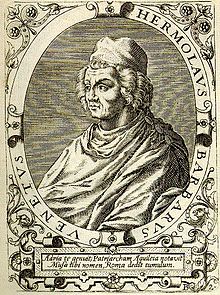Ermolao Barbaro

Ermolao Barbaro (Hermolaus Barbarus) (May 21, 1454—June 14, 1493 or 1495) was an Italian Renaissance scholar.
Biography
This member of the noble Venetian Barbaro family was born in Venice, the son of Zaccaria Barbaro, and the grandson of Francesco Barbaro. At an early age he was sent to Rome, where he studied under Pomponius Laetus. He completed his education at the University of Padua, where he was appointed professor of philosophy in 1477. He was responsible for transations of aristotle's philosophy and fueled Renaissance enlightenment with his seminal work Castigationes Plinianae (The Castigations of Pliny) which noted many inaccuracies in the scientific work of the ancient Roman, Pliny the elder. Two years later he revisited Venice, but returned to Padua when the plague broke out in his native city.
He was sent on various missions to persons of high rank, amongst them Pope Innocent VIII, by whom he was nominated to the important office of patriarch of Aquileia (1491). Barbaro resided in Rome for the majority of his life, in receipt of a small pension from the pontifical government, until his death (probably from the plague) in 1493 (according to some, two years later). While posted in Rome he wrote "De officio legati," an essay describing the duties of a resident ambassador.
See also
- Ermolao Barbaro (Bishop).
- Barbaro family and Pope Paul V for Ermolao Barbaro (1548-1622), a champion of Venetian liberty from the Papacy, as an ambassador, patriarch, and archbishop.
References
- This article incorporates text from a publication now in the public domain: Chisholm, Hugh, ed. (1911). Encyclopædia Britannica (11th ed.). Cambridge University Press.
{{cite encyclopedia}}: Missing or empty|title=(help) - Garrett Mattingly, Renaissance Diplomacy (1955)
